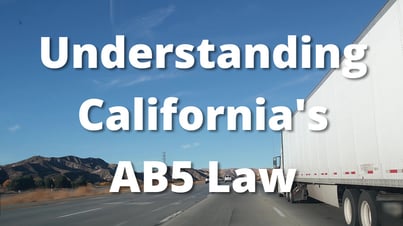Does your company hire truck drivers in California? If so, are the drivers your employees or independent contractors? If you said, ‘independent contractors,’ you’ll want to double check that. California’s AB5 law affects truck driver classification in the state so that drivers you think you’re hiring as independent contractors may actually be seen as employees in the eyes of the law.
What is California’s AB5 law?
 Signed into law by Governor Gavin Newsom, California’s Assembly Bill 5 (AB5) has codified a new system for determining whether truck drivers – and other “gig economy” workers – are independent contractors or employees of the companies they work for.
Signed into law by Governor Gavin Newsom, California’s Assembly Bill 5 (AB5) has codified a new system for determining whether truck drivers – and other “gig economy” workers – are independent contractors or employees of the companies they work for.
This system relies on the ABC test and stems from the landmark driver misclassification case, Dynamex Operations West Inc. vs The Superior Court of Los Angeles County. In that case, the California Supreme Court ruled that, in the event of a class action suit, drivers (and other types of workers) will be presumed to be employees of a company and not independent contractors unless the following criteria (i.e., the “ABC test” criteria) are met:
- the worker is free from the control and direction of the hiring entity in connection with the performance of the work
- the worker performs work that is outside the usual course of the hiring entity’s business; and
- the worker is engaged in an independently established trade, occupation, or business of the same nature as the work performed.
In part “B” of that test, the company must prove that it hired a contractor for a role outside of its normal company function. A transportation company (i.e., drayage carrier) that is hiring a driver to provide transportation services is not going to pass that test. This opens the door, then, for any driver who is hired as an independent truck driver to later claim to be an employee and to sue for wages and benefits.
Does SB 1402 also affect the trucking industry?
Shortly after the Dynamex decision, an important state Senate Bill was also signed into legislation. Known as Senate Bill 1402 (or SB 1402), the Bill establishes the creation of a public list of trucking carriers who have misclassification-related judgments against them. Shippers who do business with a carrier on this list will be held jointly liable for wages and/or damages the carrier owes to its drivers for work weeks in which the carrier performed services for the shipper.
The law firm Fisher Phillips breaks down who is and is not a “customer” under SB 1402:
“’Customer’ means a business that engages or uses a port trucking company to perform services on the customer’s behalf, whether the customer directly engages or uses a port trucking company or indirectly uses a company through the use of an agent such as a freight forwarder, motor transportation broker, ocean carrier, or other motor carrier. However, ‘customer’ does not include (1) a business with fewer than 25 workers, (2) public entities, or (3) a marine terminal operator or similar business who has incidental relationships with port trucking companies.”
What should shippers do in the face of these laws?
If you’re a shipper that needs to source transportation services in California, your directive is simple: avoid the headaches and potential financial penalties associated with AB5 and SB 1402 transgressions. But how? Fortunately, the answer here is also simple. You need to work with transportation providers that staff their fleets only with employee drivers. By not working with carriers that hire independent truck drivers, you’ll never have to worry about those drivers being misclassified.
The following are questions you can ask your prospective carriers to determine if they hire employee drivers.
- “Are your drivers hourly employees or owner-operators?” This simple question should elicit a simple response.
- “Do you hire independent contractors?” ‘Independent contractors’ is just another term for owner-operators. Carriers may use one term or another or use them interchangeably.
- “Do you outsource my freight to small trucking companies?” Small companies are very likely going to rely on the services of owner-operators. So, if a carrier outsources to small trucking companies, they are likely using owner-operators.
- “Are your drivers unionized?” This is simply another way of asking if drivers are hourly employees. Unionized drivers are going to be employees and not, obviously, independent contractors.
Even after you ask all your questions and reach a comfort level with your provider, you can still protect yourself by placing language in your contract or tariff page. This language can state that you do not authorize the use of independent drivers in performing drayage services and other transportation operations.
Comply with California’s AB5 law for trucking services
If you’re looking for California trucking services, but are understandably sheepish about running foul of the state’s misclassification laws, turn to Weber Logistics. Weber is a California warehousing and trucking company – with uniformed employee drivers – that specializes in final-mile delivery to mass retailers and grocery chains in the Western U.S. Our fixed-asset fleet delivers dry and temp-controlled loads direct throughout the region, with next-day service to your CA, AZ and NV customers. Best of all, our transportation services integrate seamlessly with our port drayage and warehousing operations in the state.
To learn more about optimizing your California supply chain services while complying with all state regulations, contact Weber Logistics today.




 Capital Management
Capital Management